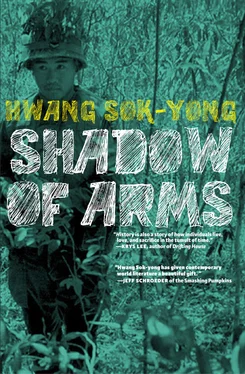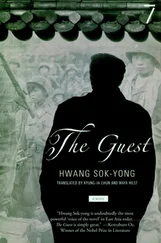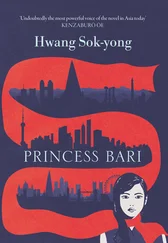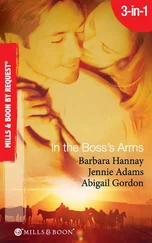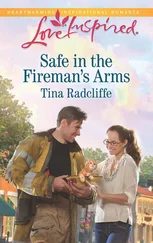Interrogator: So up to then it was the second degree, right? When did you start with the third degree?
Nguyen: Dinner was brought in. It began after that.
Sloat: As I mentioned before, a secret mission of this kind requires the highest degree of skill and presence of mind on our part. Sergeant McCoy bungled things. As an officer I felt responsible and was ready to take the consequences.
Interrogator: What do you mean? Wasn’t that true from the start?
Sloat: At the beginning I planned to take care of it skillfully, but after dinner I gave up.
Interrogator: You’re still not making yourself clear.
Sloat: For instance, there were already too many incriminating signs on the suspect.
Interrogator: I see. You mean you decided he would not be sent back to the prisoner of war camp?
Sloat: Yes. In the end. .
Brown: After supper, Lieutenant Sloat was drinking coffee. We had eaten stew and peas. The sauce reminded me of thick blood, so I couldn’t swallow even a spoonful. Lieutenant Sloat sat there quietly for a while, then he took out a knife and handed it to Sergeant McCoy.
Interrogator: Was it a normal knife? I mean, not a machete or a sword, but a fruit knife or a workshop knife?
Cole: It was one of those knives used by the Special Forces, with a curved tip in Arabian style and serrated on the reverse side of the blade.
Interrogator: Who was the first to use the blade and for what purpose?
Cole: Sergeant McCoy took the knife and rubbed it across his palm a few times. And then he rubbed it over the boy’s back. .
Interrogator: He couldn’t stab with that knife, could he?
Brown: He sliced through the skin, though. The boy’s writhing and moaning was too much for me and I squatted down in the corner of the Quonset and threw up. Only a few peas came up and Cole started pounding on my back to help me out. McCoy kept at it for a while, and then he suddenly tossed the knife on the table. Then he told Marvin to help him since he was a soldier, too. Both Lieutenant Sloat and Marvin were silent. McCoy sneered and said officers were only imitation gentlemen and didn’t care a lick about their comrades’ dying. That was when Sloat picked up the knife and stabbed the boy in the thigh.
Sloat: In fact I suffered, too. And I was losing patience because we’d already wasted too much time. I could no longer evade the inevitable. From then on, I did everything alone. Of course, there were some results, but. .
Interrogator: Private Marvin Cole, you saw everything in detail to the end, is that right?
Cole: Yes, because I had to interpret for McCoy who was recording every single scream of agony coming from the boy.
Interrogator: Could you be more specific?
Cole: Sir, I was a brave fighter. I’ve seen dead bodies of our troops and of the enemy torn to bits by bombs or riddled by machine guns, and I’ve shot my share. But how can I describe this? It was like butchering a live calf.
Interrogator: Well, after that, did the torture continue?
Nguyen: Lieutenant Sloat told us to untie the boy and lay him down on the desk. He said we would have to start again in the morning. Because of the wounds on his back, when the boy was laid down he moaned and gasped for breath. Sergeant McCoy turned the lamp dimmer down. It seemed they were going to get a little sleep sitting in the chairs. That man must have been sick because the two prisoners were sent out for a while.
Cole: Private Howard wanted a breath of cool air, so I took him outside. The searchlight was constantly shining around us. We sat on the sand and smoked a cigarette. Suddenly Howard put his head down on his knees and burst out crying. I thought it’d be better to leave him alone. Then he turned around and called me a son of a bitch. Since I knew Vietnamese I could have stopped it if I wanted to, he said. It never had occurred to me. I was indeed Sloat’s son of a bitch.
Interrogator: Private Howard Brown, how did you think knowledge of the Vietnamese language could have put an end to the torture?
Brown: I thought Marvin could talk with the Vietnamese sergeant. He was sick and tired of it all, too.
Nguyen: I hate the communists. But I only shoot guns. The lieutenant and the sergeant did not consider Vietnamese to be human beings. The two prisoners returned. The one who knew Vietnamese asked me in a whisper if the boy had still said nothing about the guerrillas. I told him the boy seemed to be chanting some kind of prayers. Then I looked over at the lieutenant and the sergeant and found them both fast asleep. The stories the little boy had told to me while I was the only one awake beside him, well, I told all of those to Cole. That both of his parents died a year ago, killed by strafing from US helicopters. His parents had been working in the fields when a helicopter suddenly swooped down. The boy said he was there and had seen everything, seen his parents machine gunned down and dying. Cole suggested, in Vietnamese, that he and I save the boy. He said we were the only ones who knew what he was saying, and we should gain some time for him and prevent further knifing. I agreed with him.
Cole: At that moment Lieutenant Sloat abruptly awoke from sleep. He may have sensed something suspicious from our whispering in Vietnamese. He asked Sergeant Nguyen why the interrogation had stopped.
Nguyen: I responded that the suspect no longer seemed to feel any pain. But when the boy made some moaning sounds, the lieutenant asked me to hurry and interpret. I said it meant, “dear Buddha, I want to rest.” The lieutenant told me not to lie, and said he’d use the knife again unless I told the truth. That was when the guard brought breakfast in.
Brown: It was strong coffee and bacon. They ate breakfast, sitting their cups and plates on the desk right beside the bloodied boy.
Cole: After the meal was over, Lieutenant Sloat took me outside and, putting his hand on my shoulder, said in a soothing tone: once you get the necessary information you can have your rank reinstated and head back to your duty. Who knows, he said, your major might even arrange for an honorable discharge. He said that Nguyen had been playing games from the start. The boy must have revealed something important. I said he was mistaken and that the boy had been saying the same thing over and over. Sloat suddenly turned around and opened the Quonset door, summoning the guard. Drag that Vietnamese bastard out of here, he ordered. Then, half-hysterical, he said Nguyen should be locked up until someone came from his unit to collect him. Nguyen bowed to Howard and me and then left with the guard. Sloat said to McCoy, let’s you and I do it together. He looked completely insane. As soon as he picked up the knife, he started yelling at the boy in English to tell him where the guerrillas were, and then he stabbed the boy in the knee.
Brown: I’ll never forget his eyes and face at that moment as long as I live. The boy suddenly opened his eyes and glared at the lieutenant, biting his terribly swollen lips and grinding his teeth with his whole face shaking. Lieutenant Sloat dropped the knife and took a step back. I screamed that I was getting out, I’m going back to my cell. I kicked the Quonset door open and staggered out. From behind, the lieutenant shouted for me to stop, but I kept on walking. The guard ran after me and ordered me to stop, but I didn’t. I heard a gun fire. Sand splashed up at my feet. Two more shots were fired. I fell on the spot with my face hitting the sand.
Interrogator: After that, did you receive medical treatment in the hospital?
Brown: Yes, it was a through shot.
Cole: Once Howard had been carried away, Lieutenant Sloat looked down at the boy for a while and then in a unnerved voice shouted, You better not die, you little bastard! He slapped the boy’s face. Then he called the medic. The lieutenant told McCoy to call a helicopter and take the boy to the hospital. He murmured, We’ve got to keep him alive at all costs and get the information out of him. We can start over from the beginning. Hearing those words, I made up my mind.
Читать дальше
